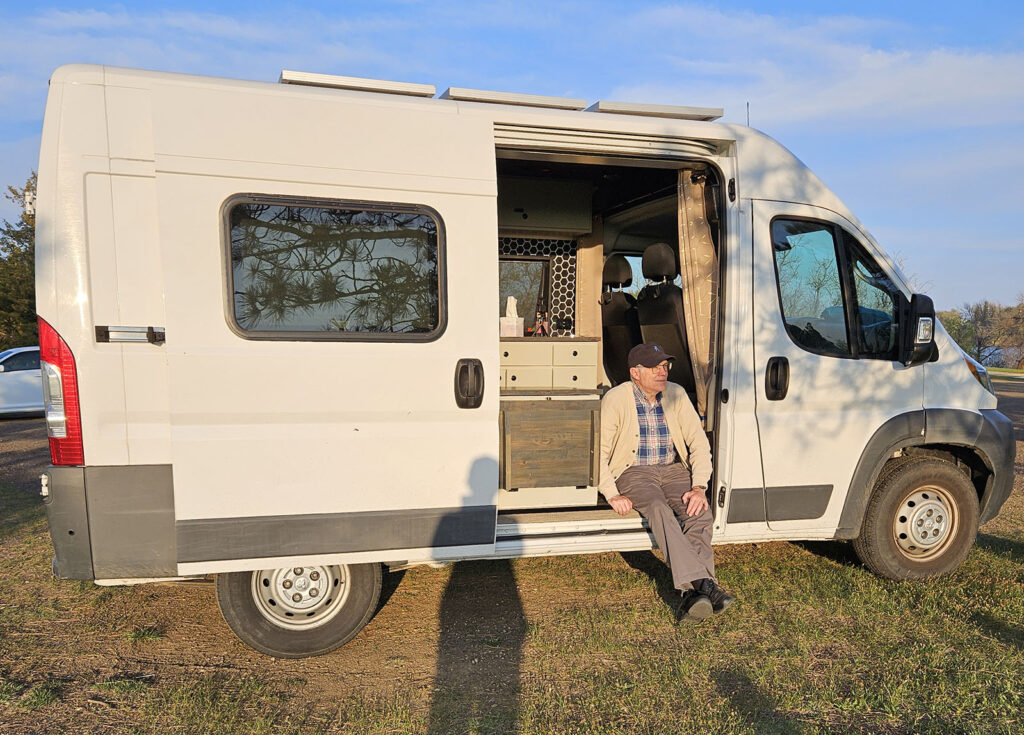It is now winter in Minnesota (we had a HIGH temperature of 19 below zero Fahrenheit a week or so ago!), and our campervan, although fitted with a solar-panel-powered electric blanket and a small propane heater (including appropriate propane and CO monitors), can’t keep us warm when it gets that cold. Thus, Mary and I have “garaged” our campervan for the season and are staying home, writing, quilting, and working on landscaping constructions in the basement.
And thinking about the state of the world and its problems with truth.
I really should avoid doing that last one as there’s a lot of bad places to go. However, I spent my whole career, forty years in science research and teaching, dealing with how to figure out truth. Sometimes people think that teaching science is about teaching information, that science is a body of knowledge to be learned.
It is not.
Instead, as I have told many students on the first day of class over the years, science is a practice. A way to explore the world around us and to figure out what is true or not.
Thus, I have some experience with how observation, reasoning, and investigation that can turn uncertain narrative into something understood to be either true or not.
And a lot of the world around us, the political world, the social world, even the ‘pop science’ world, is about unsubstantiated narrative, stories just waiting for someone to apply a bit of observation, reasoning, and investigation.
A few years back my brother, a really smart guy who shares my interest in thinking through claims and not just accepting them, said that “With some people saying this thing, and others saying that thing, there’s just no way for us to know what is actually true.”
Nnnoooooooo!!!!
I understand the concern, that with polarized news media, polarized social media, and the polarizing potential for AI-driven deep fakes, what we think we know and what we actually know may not sync up. A fellow teacher and friend at church once said to me that “the real problem is not the things that you don’t know—it is the things you DO know that are wrong!”
But, we are not yet at the place where we can’t know what is true. We still have the power to observe. We still have the power to reason. We still have the power to investigate.
Here in my little hermit hutch in the rural plains of northern Minnesota, while it’s too cold to go on adventures in my campervan, I’m going to take a few adventures of the mind and look into how we can screen out some of the fake-news nonsense in the world around us.
It begins with observation, reasoning, and investigation, not relying on the narratives that anyone, expert or not, delivers to us. Don’t worry, I’ll keep my conversation at a theoretical level and not address any specific issues, thus you are free to keep believing any favorite nonsensical narratives that you choose! However, I encourage you to spend some time rethinking them even if you know they are true. Especially in that case.
If a narrative has no evidence behind it, evidence that you yourself can see or determine, or at the very least evidence that multiple dependable sources cite as true, then that narrative is just a story and should remain in the same mental drawer as Star Wars, King Kong, and any other fictional narrative. Don’t confuse it with real science, or honest political dialogue.
In my next posting I will tell a little story about the trickiness of observation, an account of how my 5-year-old daughter saw through a silly narrative that I told to exercise her powers of reason!
